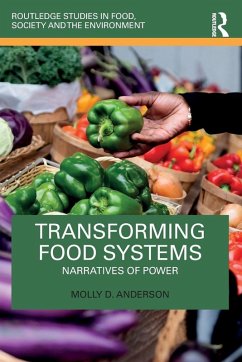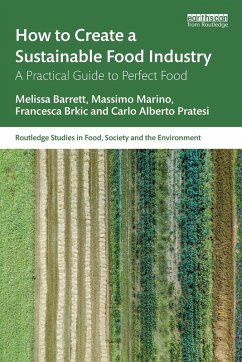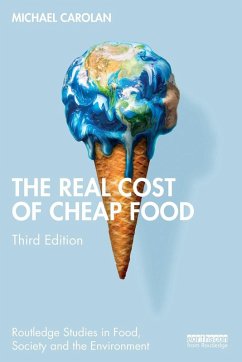
Transforming Food Systems
Narratives of Power
Versandkostenfrei!
Versandfertig in 6-10 Tagen
154,99 €
inkl. MwSt.
Weitere Ausgaben:

PAYBACK Punkte
77 °P sammeln!
This book focuses on the contested nature and competing narratives of food system transformations, despite it being widely acknowledged that changes are essential for the safeguarding of human and planetary health and well-being.The book approaches food system transformation through narratives, or the stories we tell ourselves and others about how things work. Narratives are closely connected with theories of change, although food system actors frequently lack explicit theories of change. Using political economy and systems approaches to analyze food system transformation, the author focuses o...
This book focuses on the contested nature and competing narratives of food system transformations, despite it being widely acknowledged that changes are essential for the safeguarding of human and planetary health and well-being.
The book approaches food system transformation through narratives, or the stories we tell ourselves and others about how things work. Narratives are closely connected with theories of change, although food system actors frequently lack explicit theories of change. Using political economy and systems approaches to analyze food system transformation, the author focuses on how power in food systems manifests, and how this affects whom can obtain healthy and culturally appropriate food on a reliable basis. Among the narratives covered are agroecology, food sovereignty and technological innovation. The book draws on interviews and recorded speeches by a broad range of stakeholders, including international policymakers, philanthropists, academics and researchers, workers in the food and agricultural industries and activists working for NGOs and social movements. In doing so, it presents contrasting narratives and their implicit or explicit theories of change. This approach is vitally important as decisions made by policymakers over the next few years, based on competing narratives, will have a major influence on who will eat what, how food will be produced, and who will have a voice is shaping food systems. The overarching contribution of this book is to point toward the most promising pathways for achieving sustainable food systems and refute pathways that show little hope of achieving a more sustainable future.
This book will be of great interest to students, scholars and policymakers interested in creating a sustainable food system which will ensure a food secure, socially just and environmentally sustainable future.
The book approaches food system transformation through narratives, or the stories we tell ourselves and others about how things work. Narratives are closely connected with theories of change, although food system actors frequently lack explicit theories of change. Using political economy and systems approaches to analyze food system transformation, the author focuses on how power in food systems manifests, and how this affects whom can obtain healthy and culturally appropriate food on a reliable basis. Among the narratives covered are agroecology, food sovereignty and technological innovation. The book draws on interviews and recorded speeches by a broad range of stakeholders, including international policymakers, philanthropists, academics and researchers, workers in the food and agricultural industries and activists working for NGOs and social movements. In doing so, it presents contrasting narratives and their implicit or explicit theories of change. This approach is vitally important as decisions made by policymakers over the next few years, based on competing narratives, will have a major influence on who will eat what, how food will be produced, and who will have a voice is shaping food systems. The overarching contribution of this book is to point toward the most promising pathways for achieving sustainable food systems and refute pathways that show little hope of achieving a more sustainable future.
This book will be of great interest to students, scholars and policymakers interested in creating a sustainable food system which will ensure a food secure, socially just and environmentally sustainable future.














